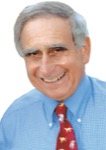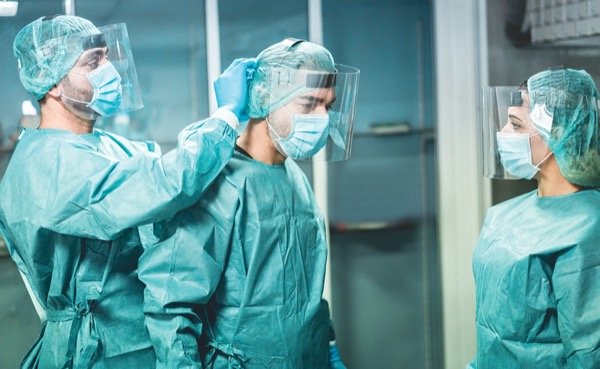
The trademark of a surgeon has been the ability to make decisions and take responsibility for them. This is a standard of the profession, often involving critical, life-and-death choices and outcomes for patients. In addition, a surgeon’s decisions affect coworkers, the institution and professional discipline. Certainly, these decisions are integral to the surgeon’s personal life, family, income and community. The COVID-19 era has complicated the lives of surgeons and has imposed decisions on them not previously experienced. These new choices often are difficult to make and may involve family decisions as well as one’s surgery practice, the surgical team, and considering institutional mandates, community relations, and ultimately the fundamental doctor–patient relationship.
To Work or Not to Work
Should a vulnerable surgeon sit this one out? The severity of COVID disease, hospital and ICU admissions, and death accelerate with age, in particular after 60 years old. At any age, other risk factors include obesity, type 2 diabetes, renal and cardiac disease, chronic obstructive pulmonary disease and asthma, active cancers, and immune deficiency. Many surgeons in active practice fall into one of these risk categories. Some of them, as well as active surgeons without heightened risks, have chosen to retire, and others to stop both operating and patient management on a temporary basis. Most surgeons, however, have not stopped working; many have contracted COVID-19, and some have died.
If the surgeon elects to work, what will that work be? The first decision by the individual surgeon, the group or the hospital institution is whether the performance of surgery with the requisite pre- and postoperative care should be curtailed and postponed as being elective, or is it to be considered urgent or emergency, with postponement impossible or likely to cause harm to the patient? Most cosmetic surgery can be delayed; a perforated viscus cannot. Knee replacement could or could not be rescheduled, and cancer surgery rarely should be.
In the December 2020 issue of General Surgery News, I wrote an article stating that bariatric surgery was not elective. However, at the beginning of COVID, bariatric surgery was canceled essentially everywhere in the world. Bariatric surgery is metabolic surgery, and, in addition to weight loss, mitigates type 2 diabetes, hypertension, hyperlipidemia and atherosclerotic cardiovascular disease, nonalcoholic steatohepatitis, obstructive sleep apnea, and the numerous debilitating orthopedic complications of obesity. Because obesity per se, and its metabolic complications, increase susceptibility to the severity of COVID-19, metabolic/bariatric surgery becomes an urgent prerogative.
If the routine operative practice of a surgeon becomes restricted or halted by the nature of the surgery, or by the loss of nurses and other personnel needed elsewhere in a flood of COVID-19 hospital admissions, or institutional emergency policy, the active surgeon may be asked to serve as a physician for COVID-19 management. Many intensivists are also operating surgeons in a surgical discipline; they will likely have to concentrate most of their efforts and extra hours on COVID-19.
The Team
Team interactions are reciprocal and the decisions of one party affect all others. As stated, nursing personnel may be pulled out of the OR during a COVID crisis. Alternatively, a surgeon who reduces his or her caseload or stops operating during an increased number of cases can cause unemployment not only of OR nursing personnel, but of many other healthcare and clerical team members in the operating suite, surgical patient admissions, in-hospital care and postoperative follow-up. The work-from-home policy of many institutions during the pandemic is difficult, if not impossible, to employ in taking care of patients. If there are fewer patients, other than those with COVID-19, staffing may be reduced. Thus, a surgeon’s decision to work or not to work, or what work to perform, affects many of the surgeon’s coworkers.
Institutional Mandate
Since most surgeons today are employees of a hospital or medical conglomerate, they have abdicated many decisions to the administration of their institutions. Under non-COVID conditions, surgeons can differ with their institutions on the election of offered patient services and the acquisition of equipment. This ambivalence has been greatly heightened during the pandemic because the stakes are higher. Ordinarily, patient care has several acceptable alternatives, and the surgeon is compensated for surrendering personal independence by lifestyle accommodations and perks. During COVID-19, however, the institution’s decisions—often based on how to use the crisis to maximize profits—can accelerate discord between physicians and the institution, and precipitate a fundamental challenge of ethical principles.
Family
These questions—to work or not, what kind of work to do, the hours to work, the facilities to work in, and other considerations—are decisions that surgeons make not only for themselves, but for their families as well. Many surgeons, especially young surgeons recently in practice and practice groups with an extensive payroll, cannot financially sustain prolonged unemployment or restrictions in the number of operations performed. They must work to support their families. At the same time, they need to consider the risk to the family when they work in an environment with many cases of the coronavirus.
By working, surgeons may die or become debilitated. The World Health Organization estimates that 80,000 to 180,000 healthcare workers have died from COVID-19 worldwide. More than 3,600 U.S. healthcare workers, out of 170,000 afflicted, have died from COVID-19, including over 100 physicians. Of those who have recovered, 50% suffer from lingering symptoms for six months, and 20% have long COVID and are unable to work full time or even work at all. Healthcare workers and their families account for one out of six U.S. hospital COVID-19 admissions, and healthcare workers are seven times as likely to have severe COVID-19 as workers in other fields.
The surgeon may bring the virus home to the family. A considerable number of surgeons have COVID-susceptible family members. Their lives, therefore, involve constant testing. I know of surgeons who have chosen to live apart from their families in hospital on-call rooms. Their lives resemble a military deployment. I know of surgeons who have rented separate living facilities for susceptible family members so they feel more comfortable going home themselves. Certainly, family gatherings, dinners, vacations have all been severely disrupted. Pleasures such as going to restaurants and movies have been eliminated.
Community
The COVID-19 pandemic is the result of infections by several variants of a coronavirus named SARS-CoV-2. This encapsulated RNA virus has spikes that enable cellular penetration for its replication by the host mitochondria. The virus has no political preference; it favors no particular creed, race, nationality or geography; it especially targets the vulnerable population. Yet, many people in the United States and worldwide have endowed this lethal 0.1-micron particle with an agenda, a thought process, so to speak, to carry out the purposes of the believer’s enemies. Others, seeing death and suffering all around them, even in their own families, refuse to acknowledge that this particle can do them harm but can be avoided by ingesting some dangerous bizarre substance. I once believed that if alien creatures from outer space invaded Earth to feast on humans, all people would forget their differences and unite to fight the common enemy. Now, I am not so sure.
Herd immunity may be achieved as the result of a devastating death toll, suffering and socioeconomic destruction, as was the case in the Spanish flu pandemic of 1917-1919. Even if virus eradication may never be achieved, a diminution of annual infections, and, in particular, of annual deaths, may become a norm. If we follow the scientifically proven, common-sense procedures of vaccination, temporary masking and social distancing, and continue the development of therapeutic and prophylactic pharmaceuticals, we will achieve herd immunity with the least human damage, and perhaps even eradicate this virus.
The decisions of a single or a group of surgeons, and a surgical discipline, may greatly influence a community, large and small. In terms of influencing public opinion, as a body of physicians, we do not have the same effect on public thought and actions as the NFL quarterback who does not get vaccinated. We do not have the same impact as certain elected officials and media commentators who scoff at mask wearing and social distancing. As physicians, however, true to our professional oaths, we must speak out against poor advice. Sadly, even though most of us represent science, public health and a profession we elected as our life’s work, in 2021, the 71 members of the Federation of State Boards of Medicine received an increase in complaints about doctors spreading false or misleading COVID-19 information, and 12 boards have taken disciplinary action against physicians who have violated their license by stating medical falsehoods.
Doctor–Patient Relationship
In the final analysis, the decisions that surgeons make in their discipline and their doctor–patient relationships will be the legacy of our profession in the era of COVID-19. Recently, a major, international, metabolic/bariatric surgery society’s senior members engaged in a debate. The proposition was put forth that we should refuse surgery to those who refuse vaccination. The rationale for this action was that it would promote vaccination, protect our tired and diminishing healthcare workers from an unnecessary and possibly fatal risk, and serve the community by emphasizing that one of the prime requisites of a society is to protect the individual’s freedom of choice except when it impinges on the freedoms of others, in particular their freedom to live in good health. The counterargument raised was that this policy voids our creed of offering our knowledge and skills to all in need. After all, we have never refused our services to patients with self-inflicted illnesses resulting from smoking or excessive drinking. We have cared for enemy soldiers on the battlefield, at times with great personal risk to us and other healthcare personnel. The decision between these alternatives is a personal decision for the individual surgeon, but one that reflects on our discipline and our entire profession. This ambiguity of choice is not limited to surgeons; it involves all physicians.
Conclusion
I end with the declaration that surgeons and all physicians face heightened decisions during the COVID-19 pandemic. As in the past, a surgeon’s trademark is to make decisions and take responsibility for them.
Dr. Buchwald is a professor of surgery and biomedical engineering, and the Owen H. and Sarah Davidson Wangensteen Chair in Experimental Surgery (emeritus), at the University of Minnesota, in Minneapolis. His articles appear every other month.
Editor’s note: Opinions in General Surgery News belong to the author(s) and do not necessarily reflect those of the publication.
This article is from the February 2022 print issue.



Please log in to post a comment